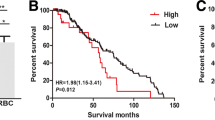Abstract
Background
AKR1B10 is considered to contribute to cell proliferation and chemoresistance. In the present study, we examined whether AKR1B10 expression is associated with disease-free survival in bladder cancer patients.
Methods
We obtained bladder cancer specimens from 10 patients before and after chemotherapy and measured AKR1B10 mRNA levels using real-time PCR. In addition, we conducted an immunohistochemical examination of AKR1B10 expression in 57 patients with bladder cancer before and after chemotherapy.
Results
AKR1B10 mRNA expression was significantly higher in the post-chemotherapy group than in the pre-chemotherapy group (p < 0.001). The average immunohistochemical intensity score in the pre-chemotherapy group was 0.83 ± 1.08, compared with the significantly higher score of 2.03 ± 1.03 in the post-chemotherapy group (p < 0.001). The disease-free survival rate of post-chemotherapy AKR1B10(+) patients (61.2%) was significantly lower than that of AKR1B10(−) patients (100%) (log-rank test, p = 0.039).
Conclusions
Although the present study is small and preliminary, our data suggest that post-chemotherapy AKR1B10 expression may be associated with a poor prognosis in patients who received carboplatin–gemcitabine combination chemotherapy and underwent cystectomy. Further study is warranted to elucidate its clinical significance.


Similar content being viewed by others
References
Penning TM (2005) AKR1B10: a new diagnostic marker of non-small cell lung carcinoma in smokers. Clin Cancer Res 11:1687–1690
Kasajima H, Yamagishi S, Sugai S et al (2001) Enhanced in situ expression of aldose reductase in peripheral nerve and renal glomeruli in diabetic patients. Virchows Arch 439:46–54
Oates PJ (2010) Aldose reductase inhibitors and diabetic kidney disease. Curr Opin Investig Drugs 11:402–417
Hwang YC, Kaneko M, Bakr S et al (2004) Central role for aldose reductase pathway in myocardial ischemic injury. FASEB J 18:1192–1199
Yagihashi S, Mizukami H, Ogasawara S et al (2010) The role of the polyol pathway in acute kidney injury caused by hindlimb ischaemia in mice. J Pathol 220:530–541
Cao D, Fan ST, Chung SS (1998) Identification and characterization of a novel human aldose reductase-like gene. J Biol Chem 273:11429–11435
Fukumoto S, Yamauchi N, Moriguchi H et al (2005) Overexpression of the aldo-keto reductase family protein akr1b10 is highly correlated with smokers’ non-small cell lung carcinomas. Clin Cancer Res 11:1776–1785
Yoshitake H, Takahashi M, Ishikawa H et al (2007) Aldo-keto reductase family 1, member b10 in uterine carcinomas: a potential risk factor of recurrence after surgical therapy in cervical cancer. Int J Gynecol Cancer 17:1300–1306
Heringlake S, Hofdmann M, Fiebeler A et al (2010) Identification and expression analysis of the aldo-ketoreductase1-B10 gene in primary malignant liver tumours. J Hepatol 52:220–227
Wang C, Yan R, Luo D et al (2009) Aldo-keto reductase family 1 member B10 promotes cell survival by regulating lipid synthesis and eliminating carbonyls. J Biol Chem 284:26742–26748
Martin HJ, Breyer-Pfaff U, Wsol V et al (2006) Purification and characterization of akr1b10 from human liver: role in carbonyl reduction of xenobiotics. Drug Metab Dispos 34:464–470
Koie T, Yamamoto H, Okamoto A et al (2009) Feasibility and efficacy of gemcitabine and carboplatin neoadjuvant chemotherapy in muscle-invasive bladder cancer. J Clin Oncol 27(suppl):e16100
Calvert AH, Newell DR, Gumbrell LA et al (1989) Carboplatin dosage: prospective evaluation of a simple formula based on renal function. J Clin Oncol 7:1748–1756
Langer S, Kokozidou M, Heiss C et al (2010) Chronic kidney disease aggravates arteriovenous fistula damage in rats. Kidney Int 78:1312–1321
Takahashi M, Hoshi A, Fujii J et al (1996) Induction of aldose reductase gene expression in LEC rats during the development of the hereditary hepatitis and hepatoma. Jpn J Cancer Res 87:337–341
Zeindl-Eberhart E, Jungblut PR, Otto A et al (1997) Further characterization of a rat hepatoma-derived aldose-reductase-like protein—organ distribution and modulation in vitro. Eur J Biochem 247:792–800
Baris D, Karagas MR, Verrill C et al (2009) A case–control study of smoking and bladder cancer risk: emergent patterns over time. J Natl Cancer Inst 101:1553–1561
Kurahashi N, Inoue M, Iwasaki M et al (2009) Coffee, green tea, and caffeine consumption and subsequent risk of bladder cancer in relation to smoking status: a prospective study in Japan. Cancer Sci 100(2):294–391
Yan R, Zu X, Ma J et al (2007) Aldo-keto reductase family 1 B10 gene silencing results in growth inhibition of colorectal cancer cells: implication for cancer intervention. Int J Cancer 121:2301–2306
Conflict of interest
The authors declare that they have no conflict of interest.
Author information
Authors and Affiliations
Corresponding author
About this article
Cite this article
Hashimoto, Y., Imanishi, K., Tokui, N. et al. Carboplatin–gemcitabine combination chemotherapy upregulates AKR1B10 expression in bladder cancer. Int J Clin Oncol 18, 177–182 (2013). https://doi.org/10.1007/s10147-011-0363-7
Received:
Accepted:
Published:
Issue Date:
DOI: https://doi.org/10.1007/s10147-011-0363-7




